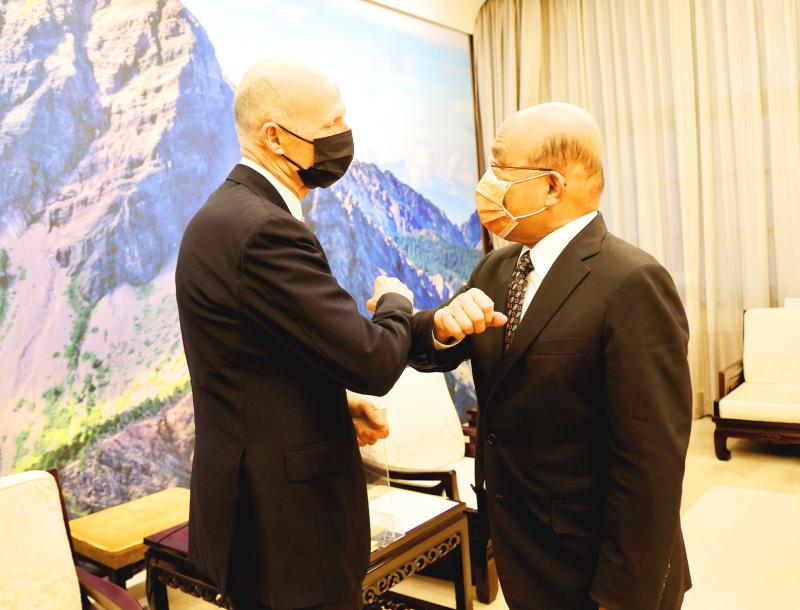The Ministry of Health and Welfare’s long-term healthcare 2.0 project has grown to serve nearly four times the number of people it handled when it started five years ago, it told the Cabinet yesterday.
The program is serving 470,000 people, or 3.8 times more than in 2017, while its coverage has surged by more than 300 percent to cover 67.03 percent of the nation and its budget has increased to NT$60.7 billion (US$2 billion) since 2016, it said.
A Taiwan Marketing Research poll, commissioned by the ministry, showed that more than 90 percent of respondents over three consecutive years said they were satisfied with the program and how it alleviated stress for people caring for those with long-term illnesses.

Photo: CNA
The program received a 97.6 percent satisfaction rating last year, demonstrating that the public supports the initiative, the ministry said.
Since its inception, the program’s main goal has been to establish at-home, communal or stay-over healthcare for people who require long-term care, establish payment schemes for workers, guarantee wages for long-term healthcare workers, increase service coverage, and develop measures to prevent or slow the loss of cognitive abilities among older people.
The program provides care through three types of centers: Category A is comprised of communal integrative service centers, category B are composite service centers and category C consists of front-end care centers.
Premier Su Tseng-chang (蘇貞昌) said that the number of service locations across all three categories exceeded 11,000 nationwide, while the “one day care center per school area” project has also grown to 760 centers, with the two combining for a total national coverage rate of 65 percent.
Su has instructed the ministry to continue to improve the initiative and said he would ask agencies such as the Ministry of Labor, the Ministry of Education, the Ministry of Finance, the Ministry of Economic Affairs and the Financial Supervisory Commission to help with the program.
The health ministry said it wants the program to change the public’s perception of long-term healthcare, moving from all-day and one-on-one service models to daycare centers where a few workers can aid many people, or to a small-scale multifunctional family care service model.
The ministry is encouraging people to interact more with professional care workers and help “train” people to take more responsibility in caring for themselves to reduce their need for full-time care.

Japanese footwear brand Onitsuka Tiger today issued a public apology and said it has suspended an employee amid allegations that the staff member discriminated against a Vietnamese customer at its Taipei 101 store. Posting on the social media platform Threads yesterday, a user said that an employee at the store said that “those shoes are very expensive” when her friend, who is a migrant worker from Vietnam, asked for assistance. The employee then ignored her until she asked again, to which she replied: "We don't have a size 37." The post had amassed nearly 26,000 likes and 916 comments as of this

US President Donald Trump said "it’s up to" Chinese President Xi Jinping (習近平) what China does on Taiwan, but that he would be "very unhappy" with a change in the "status quo," the New York Times said in an interview published yesterday. Xi "considers it to be a part of China, and that’s up to him what he’s going to be doing," Trump told the newspaper on Wednesday. "But I’ve expressed to him that I would be very unhappy if he did that, and I don’t think he’ll do that," he added. "I hope he doesn’t do that." Trump made the comments in

Tourism in Kenting fell to a historic low for the second consecutive year last year, impacting hotels and other local businesses that rely on a steady stream of domestic tourists, the latest data showed. A total of 2.139 million tourists visited Kenting last year, down slightly from 2.14 million in 2024, the data showed. The number of tourists who visited the national park on the Hengchun Peninsula peaked in 2015 at 8.37 million people. That number has been below 2.2 million for two years, although there was a spike in October last year due to multiple long weekends. The occupancy rate for hotels

A cold surge advisory was today issued for 18 cities and counties across Taiwan, with temperatures of below 10°C forecast during the day and into tonight, the Central Weather Administration (CWA) said. New Taipei City, Taipei, Taoyuan and Hsinchu, Miaoli and Yilan counties are expected to experience sustained temperatures of 10°C or lower, the CWA said. Temperatures are likely to temporarily drop below 10°C in most other areas, except Taitung, Pingtung, Penghu and Lienchiang (Matsu) counties, CWA data showed. The cold weather is being caused by a strong continental cold air mass, combined with radiative cooling, a process in which heat escapes from